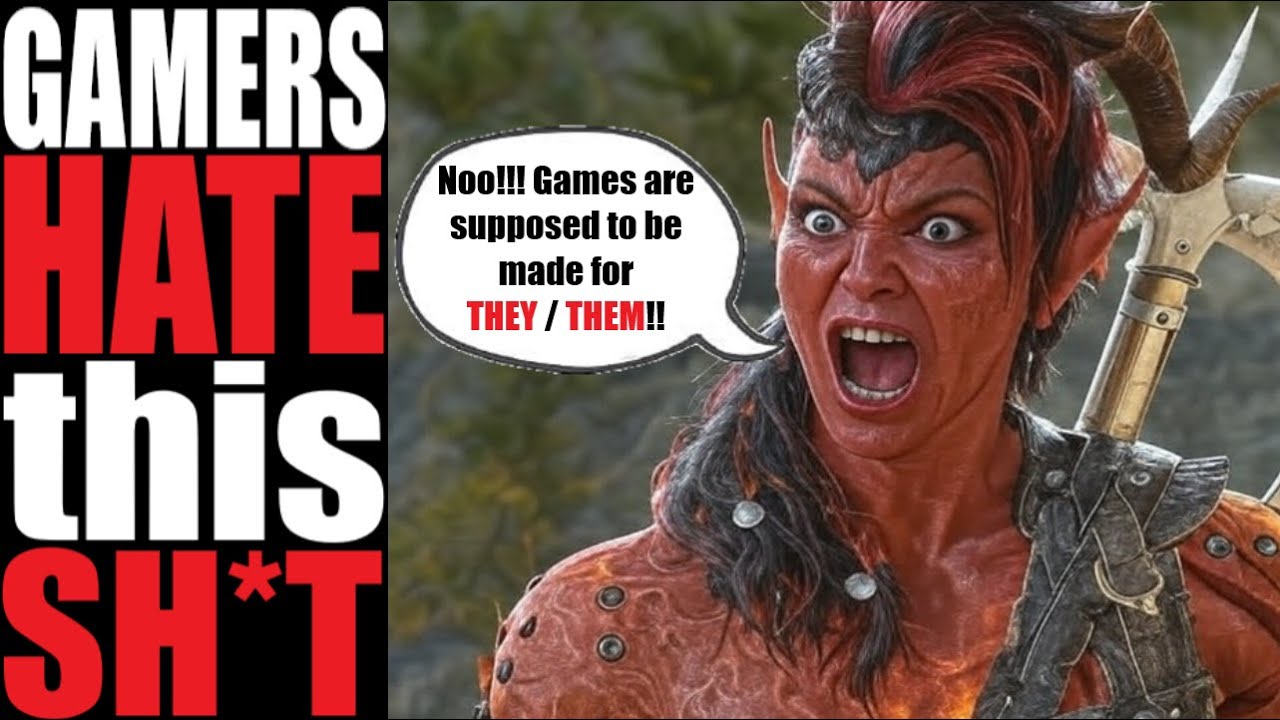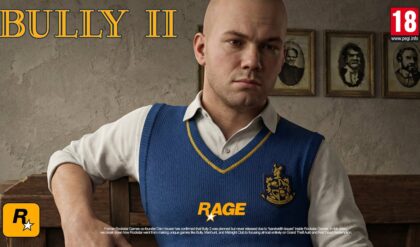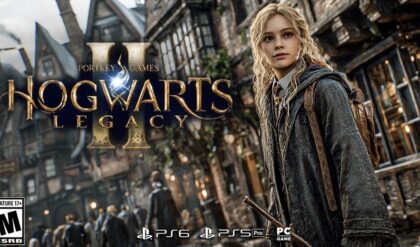SHOCKING Claim from Baldur’s Gate 3 Star!
A woke actor just dropped a bombshell: queer stories are VANISHING from AAA games! Is this censorship real, or are they stirring the pot? 😲
👉 Find out what’s really going on:

The Controversy Over Queer Stories in AAA Games: Samantha Béart’s Claims and the Gaming Industry’s Response
Introduction
The gaming world is no stranger to controversy, but a recent statement by Samantha Béart, the voice actor for Karlach in Baldur’s Gate 3, has sparked a firestorm. In an interview with The Gamer on July 5, 2025, Béart claimed that queer storylines are being systematically cut from AAA games due to political pressures, particularly in the wake of the Trump administration’s return in late 2024. The assertion, amplified by posts on X and heated Reddit threads, has divided fans, with some decrying censorship and others dismissing Béart’s claims as exaggerated or agenda-driven. This controversy, framed by some as a backlash against “woke” actors, raises critical questions about diversity, creative freedom, and the future of storytelling in gaming. This article explores Béart’s allegations, the industry’s response, and the broader implications for queer representation in AAA titles.
Baldur’s Gate 3: A Benchmark for Queer Representation
Released in August 2023 by Larian Studios, Baldur’s Gate 3 is a critically acclaimed RPG based on the Dungeons & Dragons 5th edition ruleset. The game is celebrated for its inclusive storytelling, allowing players to customize their character’s pronouns, gender presentation, and romantic preferences, with companions like Astarion, Shadowheart, and Karlach offering diverse romance options regardless of gender. Its “queer-friendly” approach, dubbed “the queerest game of all time” by PinkNews, earned it five nominations at the 2024 Gayming Awards, including Game of the Year and Best LGBTQ+ Character. The game’s success—selling 15 million copies by November 2024—proved that diverse narratives could resonate with a broad audience.
Samantha Béart, who identifies as non-binary, brought Karlach, a fiery tiefling barbarian, to life with a performance praised for its emotional depth. Their comments about queer storylines being cut have drawn attention due to Baldur’s Gate 3’s status as a diversity benchmark, making Béart’s claims both credible and contentious.
The Allegation: Queer Stories Under Fire
In their interview, Béart stated, “Without exposing devs, I know that’s happening. Their storylines have been cut,” suggesting that AAA studios are censoring LGBTQ+ content to avoid backlash in a politically charged climate. They expressed concern that a game as inclusive as Baldur’s Gate 3 would struggle to get greenlit today, pointing to the Trump administration’s anti-DEI (Diversity, Equity, Inclusion) policies as a catalyst. Béart’s remarks come amid broader reports of diversity rollbacks, such as Disney removing a transgender storyline from Pixar’s Win or Lose and scrubbing queer-coded elements from Elio.
The claim has sparked polarized reactions. Supporters, including fans on Reddit’s r/BaldursGate3, argue that Béart’s warning highlights a troubling trend, citing the harassment faced by developers of inclusive games like Dragon Age: The Veilguard. Critics, particularly on r/KotakuInAction, dismiss it as “woke” hyperbole, arguing that recent “ultra-woke” games like Dustborn and Forspoken failed due to poor quality, not diversity. A YouTube video titled “BACKLASH: Woke actor from Baldur’s Gate 3 says Queer Stories are being REMOVED from AAA games” framed Béart’s comments as an admission of industry pushback against forced inclusivity.
The Context: Political Climate and Industry Trends
Béart’s allegations align with a reported shift in the gaming industry. The return of the Trump administration in 2024 has been linked to a rollback of DEI initiatives, with companies like Amazon winding down “outdated” diversity programs. The revival of the Gamergate movement, fueled by right-wing influencers, has intensified online harassment of developers and actors associated with diverse games. Games like Assassin’s Creed Shadows and Dragon Age: The Veilguard have faced review bombing and accusations of “woke” pandering, with critics arguing that diversity compromises storytelling.
Historically, queer representation in games has faced resistance. In the 2000s, BioWare was forced to cut a queer romance for Jack in Mass Effect 2 due to negative media attention from Fox News. More recently, a mod called “No Alphabets” attempted to remove all queer and trans content from Baldur’s Gate 3, including changing the lesbian character Dame Aylin into a bearded man, before being banned from NexusMods. These incidents underscore the ongoing tension between inclusivity and backlash.
However, Baldur’s Gate 3’s success challenges the narrative that diverse games don’t sell. As one Reddit user noted, “If characters are well-written, people will play and love the game,” citing early BioWare titles like Dragon Age: Origins, which included gay and bisexual characters without derailing sales. Indie games like Gone Home and Thirsty Suitors also continue to push queer narratives, suggesting that smaller studios may fill the gap if AAA developers retreat.
The Industry’s Response: Silence and Speculation
No major AAA studio has publicly confirmed Béart’s claims, and the lack of specific evidence—Béart declined to name developers—has fueled skepticism. Studios like BioWare and Insomniac, known for inclusive titles like Dragon Age and Spider-Man 2, have reiterated their commitment to diversity, but rising development costs and risk-averse publishers may pressure others to play it safe. CI Games’ CEO recently criticized forced DEI, claiming it contributed to studio closures, reflecting a broader industry debate.
On X, posts like one from @playswave_com amplified Béart’s warning, suggesting indie developers will lead inclusive storytelling. Conversely, outlets like That Park Place celebrated the alleged cuts, with comments like, “Good. I’m tired of minority characters who exist only to be minority characters.” This polarization highlights the challenge: studios face backlash whether they embrace or avoid diversity.
The Case for Queer Stories
Proponents of queer representation argue that inclusivity enhances storytelling. Baldur’s Gate 3’s flexible romance system, where players can pursue relationships with characters like Karlach or Astarion regardless of gender, creates immersive, player-driven narratives. Neil Newbon, Astarion’s voice actor, emphasized the importance of normalizing queer characters, noting the positive response from trans and queer fans. Games like The Last of Us: Left Behind and Gone Home have shown that queer stories can resonate widely when done authentically, without feeling forced.
Béart’s optimism about indie studios suggests a path forward. Titles like In Stars and Time and Coral Island continue to explore queer themes, unburdened by corporate oversight. As one Reddit user put it, “Indies and resilient devs will carry the torch,” even if AAA studios bow to pressure.
The Counterargument: Quality Over Agenda
Critics of Béart’s claims argue that the issue isn’t diversity but execution. On r/pcgaming, users suggested that “forced” DEI—where diversity feels like a checkbox rather than organic storytelling—alienates players. Games like Dustborn and Zau were cited as examples where poor writing, not diverse characters, led to failure. Others argue that market dynamics, not politics, drive content decisions, with publishers prioritizing safe bets amid rising AAA budgets, which can exceed $300 million.
The “Woke Content Detector” Steam curator, which flagged Baldur’s Gate 3 for its LGBTQ+ themes, reflects a segment of gamers who view diversity as “pro-left” propaganda. Yet, even these critics often concede that well-written diverse characters, like Wyll in Baldur’s Gate 3, enhance immersion when integrated thoughtfully.
The Broader Impact: Gaming’s Cultural Divide
The controversy mirrors broader cultural battles, as seen in your previous discussions about Dragon Age: The Veilguard, Ghost of Yotei, and Star Wars Outlaws. The term “woke” has become a catch-all for any inclusion of women, people of color, or LGBTQ+ characters, often weaponized to dismiss games regardless of quality. The harassment faced by Béart, including accusations of pushing a “woke” agenda, echoes the toxicity directed at actors like Erika Ishii and Tati Gabrielle.
This divide risks stifling creativity. If AAA studios cut queer storylines to avoid backlash, they may alienate progressive fans while failing to appease critics who reject diversity outright. Conversely, doubling down on inclusivity, as Larian did, can yield critical and commercial success but requires bold leadership and financial risk.
Looking Forward: The Future of Queer Stories
Béart’s warning highlights a precarious moment for gaming. While Baldur’s Gate 3 proved that queer-friendly games can thrive, the industry’s risk-averse nature may push diversity to the margins. Indie studios, unburdened by corporate pressures, are likely to lead, as seen in games like Deltarune and South of Midnight. Larian’s next projects, though not confirmed as Baldur’s Gate sequels, are expected to continue their inclusive approach, given the studio’s track record.
Fans can play a role by supporting diverse games and calling out toxicity. As one r/saltierthankrayt user noted, “The alt-right doesn’t want queer people to exist,” emphasizing the need for vocal allyship. Platforms like NexusMods, which banned anti-LGBTQ+ mods, also set a precedent for protecting inclusive content.
Conclusion
Samantha Béart’s claim that queer storylines are being cut from AAA games has sparked a heated debate about censorship, diversity, and the gaming industry’s future. While their allegations lack specific evidence, they reflect real fears about a rollback in inclusivity amid political and cultural pressures. Baldur’s Gate 3’s success shows that queer stories can resonate when executed well, but the industry’s risk-averse tendencies and toxic fan backlash pose challenges. As indie studios step up, the question remains: will AAA developers follow Larian’s lead or play it safe? The answer will shape gaming’s narrative landscape for years to come. Dive into the discussion and share your thoughts on where gaming’s heart lies.





